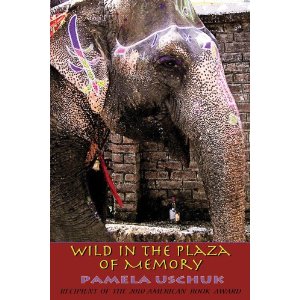- Pamela Uschuk: Review by Lori Desrosiers
Wild in the Plaza of Memory by Pamela Uschuk (Wings Press)

Pam Uschuk’s poetry in Wild in the Plaza of Memory is like the wind in her poem “Wind”: “so crazy in love with dust / this afternoon she’s writing her wild middle name / on the inside of raven’s wings.” Uschuk’s rich language and keen eye for detail are familiar from her past books, especially Crazy Love, which won the 2010 American Book Award. Wild in the Plaza of Memory goes further to open the mind of the reader to Uschuk’s vision. Besides the continued celebration of nature, these poems direct the reader’s eye to the modern struggle between the blind march of those who destroy nature and social justice, and those who understand the need to cry out against it. She does it with the use of narrative, a device which is coming back into vogue, this writer hopes, but which has been out of style for a long time.
Uschuk’s newest work takes us from Arizona to the Himalayas and back, time travels into childhood and even takes a dream leap into the spirit world. “My Brother Steps off the Jade Dragon Boat Carrying the Dead” is a knockout dream poem, or perhaps a journey of the spirit. The narrator finds her brother on the banks of a river, and they sit and watch their dogs play—a moving and believable image, combining the fantastic and the mundane.
Uschuk also examines and challenges our assumptions, particularly about the world situation in the light of today’s economic and political struggles. This book is a testament to the power of poetry to change the way people think. In “Say What,” Uschuk writes:
Say the students know they could die
but demonstrate because silence stings
deeper than an interrogator’s electric cord.
This piece is a powerful and stark testament to the current international struggle for democracy. Uschuk has been active in social justice organizations such as Split this Rock, a political poetry conference.
“A Short History of Falling” stopped this reviewer in her tracks and left her breathless, as the narrator is suspended over a cliff, holding only a turquoise rock, inviting the reader to meditate on all that is uncertain and perilous in life:
Above Mangyu Village, I hiked the thin trail
far above tree line to sunset,
bending to the infinitesimal
in the shape of a plant I could barely see,
petals the size of molecules, its yellow center
smaller than a drop of blood, when
the mountain tilted, and my shoes slid
gathering speed on talus that
prattled like oiled marbles of fate.
Uschuk sets the scene, which is preceded by a history of other falls, all nearly as frightening. Her use of scientific language is precise and yet adds to the music of the poem:
I could not stop and wondered whether to fly
off the ridge pressed flat
so I wouldn’t somersault the thousand feet
to the valley or to sit back on my heels, use
my boots for skis. The last moment
I grabbed the only thing that held
the last rim, a turquoise rock.
Here readers are propelled into the narrator’s mind, as we have all been there under duress, when the mind sometimes muses in an unrealistic way, as if there were no danger:
The other climbers thought my yelling
a joke, all but the Sherpa who leapt sure
as a mountain goat, Zen master
of shifting stone, snatched my writst
to yank me back to the path.
We sat then, breathing for a long time, unwinding
our stories like prayer flags
strung out in Himalayan wind.
I was glad to see the voice in this poem made it back, and am also glad that Pam Uschuk is still around to write more stories, unwinding “like the Himalayan wind.” The collection is divided into three sections, What Came True, meditations on nature and change, A Short History of Falling, and Wild in the Plaza of Memory. Her poems, many of which are superb narratives, also have the quality of lyric meditation, using rich language and images, with a strong emotional core to elicit the visceral response in the reader that signals a good poem. The narrative poem is becoming popular again thanks to poets like Uschuk, who are able to successfully combine narrative with lyric language.
Lori Desrosiers’ first full-length book of poems, The Philosopher's Daughter, is forthcoming from Salmon Poetry in March 2013. She has a chapbook, Three Vanities, (Pudding House Press, 2009). Her poems have appeared in Contemporary American Voices, BigCityLit, Concise Delights, Blue Fifth Review, Pirene's Fountain, The New Verse News, Common Ground Review, and many more. She is editor and publisher of Naugatuck River Review, a journal of narrative poetry.
